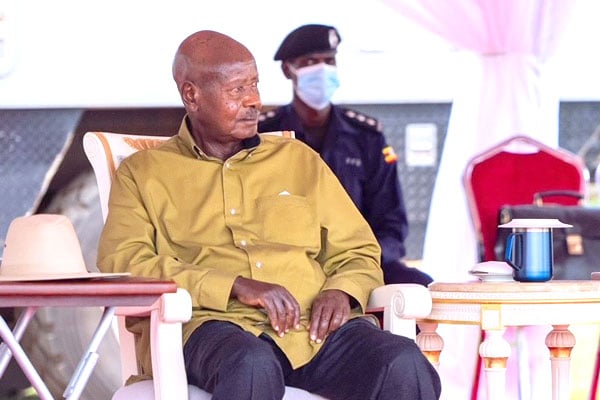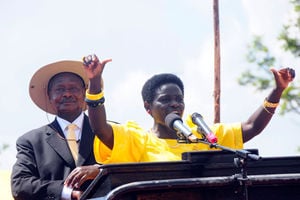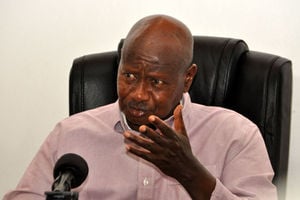
A man votes in Uganda during the 2021 elections. The government is contemplating introducing legislation that will make it mandatory for the Electoral Commission to use technology in the management of elections starting with the
2026 polls. PHOTO/FILE
The government is contemplating introducing legislation that will make it mandatory for the Electoral Commission (EC) to use technology in the management of elections starting with the 2026 elections.
Dr Chris Baryomunsi, the Information and Communication Technology and National Guidance minister, told Saturday Monitor that the idea has been gaining traction since September 12 when President Museveni claimed that the biggest Opposition party, the National Unity Platform (NUP), had rigged the 2021 General Election.
“Basically what is even coming is that we are going to make use of biometric technology mandatory so that the electoral system should be able to verify all the voters and be satisfied that before you cast the vote you are actually a registered voter,” Dr Baryomunsi said.
President Museveni, while speaking at the close of the first Defence Expo organised in memory of the late former Internal Affairs minister and Army Commander, Gen Aronda Nyakairima, claimed that NUP got one million votes more than it mustered during the 2021 poll.
Mr Museveni also claimed that the rigging was made possible because the EC chose to proceed with the polls even after the biometric machines that had been meant to assist with voter verification and identification broke down.
The door for the use of technology at the polls was opened in July 2020 when the Electoral Commission Act was amended to allow the EC to use the same in the management of the polls.
Consequently, Section 12(1) of the amended Act stipulates that “the Commission may in the exercise of its powers under subsection (1) adopt technology in the management of elections”.
Dr Baryomunsi says the problem is that the law leaves it to the discretion of the EC to choose whether to use or not to use technology.
“We used biometric technology to verify the voters, but the law, as it is today, says that the Electoral Commission may use biometric technology. So the president was speaking to the fact that when the machines broke down the exercise continued,” Dr Baryomunsi said, adding that the idea is now to make it mandatory for the EC to use technology in the management of the polls, which would mean that the polling would be brought to a halt in case of technical glitches.
Other reforms
It was not clear whether the proposal to make the use of technology compulsory will be accompanied by other reforms, some of which have remained pending for more than 25 years now.
On November 26, 2014, for example, the civil society organisations closed a two-day national dialogue on free and fair elections and adopted what was described as the “Uganda Citizens’ Compact on Free and Fair Elections”.
The document contained a raft of recommendations, including a proposal to form a new independent and impartial EC.
“The selection of commissioners and staff must follow a process of open application, public hearings and scrutiny conducted by the Judicial Service Commission. The successful applicants should be finally vetted by parliament and upon approval be submitted to the President for appointment,” the compact reads in part.
The compact further proposed that Commissioners would serve a one seven-year non-renewable term. It also recommended a complete overhaul of the EC and a review of all staff, including returning officers and presiding officers, adding that selection of the Secretariat’s staff must go through an open selection process and publicly advertised recruitment process.
Other proposals contained in the compact were compilation of a new and publicly accessible voters’ register; comprehensive and continuous civic and voter education programmes; voting for LC3, LC5, Parliament and President on the same day to avoid influence peddling and patronage in the electoral processes; barring the military from involvement in elections; and making the polls the responsibility of only the police.
The compact further proposed that the president relinquishes tactical command and control of the armed forces to the joint chiefs and must not serve as chairman of the Uganda People’s Defence Forces (UPDF) high command.
The compact radically proposed that classified appropriations and appropriations for the presidency and State House be restricted and monitored in the period of two years preceding general elections to stop presidential patronage.
The compact further proposed that public servants should resign their positions at least six months before being nominated to contest an election and that those nominated to contest should hand over all public assets in their possession before hitting the campaign trail.
The compact also suggested that Service Commissions and parastatal organisations should have separate selection, approval and appointment processes as a way of addressing the system and patronage networks.
Recommendations, proposals
The European Union (EU) sent observer missions during the 2006, 2011 and 2016 elections and followed each one up with a set of recommendations.
Among the suggestions proffered are the establishment of an inclusive and transparent mechanism for appointment and removal of the EC; strengthening the EC’s integrity by engaging civil society in the selection process; creation of a law to regulate campaign spending; and introduction of spending caps for individual parliamentary candidates.
The Opposition has over the years also tabled a number of proposed reforms, including removal of the offices of the Vice President and Prime Minister; introduction of the position of Deputy President who will be a running mate to a presidential candidate; reduction of size of Cabinet to 21 Ministers and Ministers of State; and scrapping of the Public Order Management Act (POMA).
Like civil society, the Opposition proposed public recruitment of Electoral Commission members; removal of Army representatives from Parliament and; allowing registered voters to also challenge results of presidential polls.
Scepticism
Previously, the government proposed that a person elected to Parliament as an Independent candidate be allowed to form an alliance with a political party or organisation that should not be construed to mean joining the said organisation.
Most recently, Justice Byabakama Mugenyi, the EC chairperson, proposed that the government caps campaign spending. Players operating in the country’s civic space, however, remain sceptical about both the will and intention of state actors.
“All the proposals by civil society and all stakeholders are with Parliament and it takes a very selective approach on which one to adopt and which one not to adopt. So it is up to Parliament now to pick up and adopt them. There are no new proposals that you can make,” Dr Livingstone Ssewanyana, the executive director of the Foundation for Human Rights Initiative (FHRI) initiative told Saturday Monitor.
Mr Chris Obore, Parliament’s director of communications and public affairs, said it is not the House’s “role to initiate constitutional amendments or electoral reforms.” He added: “Electoral reforms are the initiative of the executive arm of government.”
It is not clear whether the government will now pick up any of the reforms that all the others had brought forward, but Mr Ssewanyana’s conclusion is an indictment of both Parliament and government for pussyfooting on the electoral reforms.
Dr Baryomunsi, however, defended the government and instead accused the political Opposition of not doing anything to drive the process of reform forward.
“You have [Opposition] MPs. If the government delays an MP can bring a proposal on the floor. I have not seen any bringing it. Our colleagues in Opposition just make noise on the radios, but I have not seen them draft a private members bill to that effect,” Dr Baryomunsi told Saturday Monitor.
Blame game
On Tuesday, Mathias Mpuuga, the immediate past Leader of Opposition in Parliament (LoP), issued a notice in which he revealed plans to table a Private Member’s Bill that details proposed electoral reforms.
Mr Mpuuga, who is also the Nyendo-Mukungwe lawmaker, said he was compelled to contemplate the action thanks to the government’s failure to execute its mandate on time.
“While we await for the commitment for the Deputy Attorney General to present wide ranging constitutional reforms, some of [which] touch on the core subject of elections, the Electoral Commission has gone ahead with its programmes, the roadmap has been scheduled,” Mr Mpuuga noted, adding, “We have hardly 12 months to go into electoral activities. I have had parties announcing their own roadmaps, including the ruling party. Are we just being convenient? Are we really getting commitment?”
Mr Thomas Tayebwa, the deputy House Speaker who chaired Tuesday’s plenary session, asked Mr Norbert Mao, the Justice and Constitutional Affairs minister, to “come and update us on the issues of electoral reforms.” Minister Mao was away on official duty this workweek, attending the UN general assembly in New York.
“The Minister of Justice should come and update us on the issues of electoral reforms. When is [the Justice and Constitutional Affairs minister] presenting electoral reforms?” the Deputy House Speaker asked, adding, “We shall be stampeded at the last minute and remember that [the] court has on several occasions touched on that issue and the Electoral Commission itself. I have seen the chief (i.e. chairperson) Electoral Commission saying that reforms come in late.”
ELECTION ROADMAP
According to the revised summary roadmap for the 20225/2026 General Elections issued by the EC at the back-end of July, public servants intending to contest for political office will be expected to resign between June 13 and October 1, 2025. Nomination of candidates for parliamentary elections has been pencilled in form between September 16 and 17,,2025. The nomination of candidates for presidential elections will be between October 2 and 3, 2025. The polling period for presidential, parliamentary and Local Government Councils will be between January 12 and February 9, 2026




